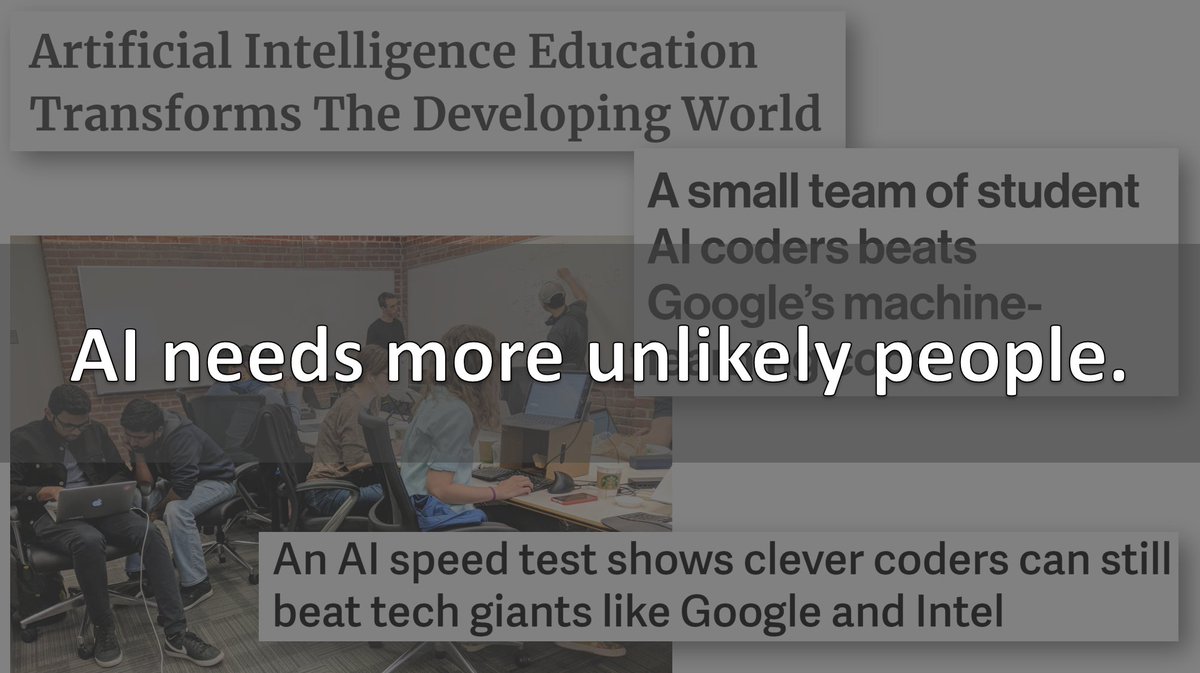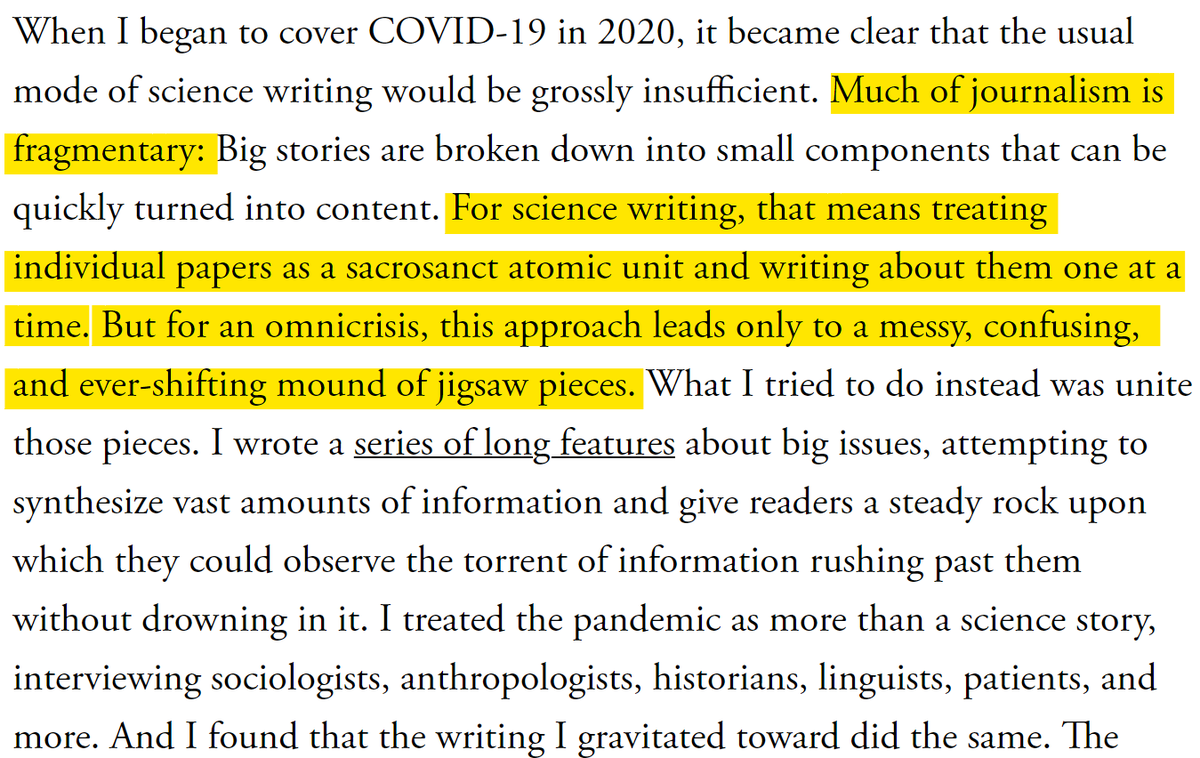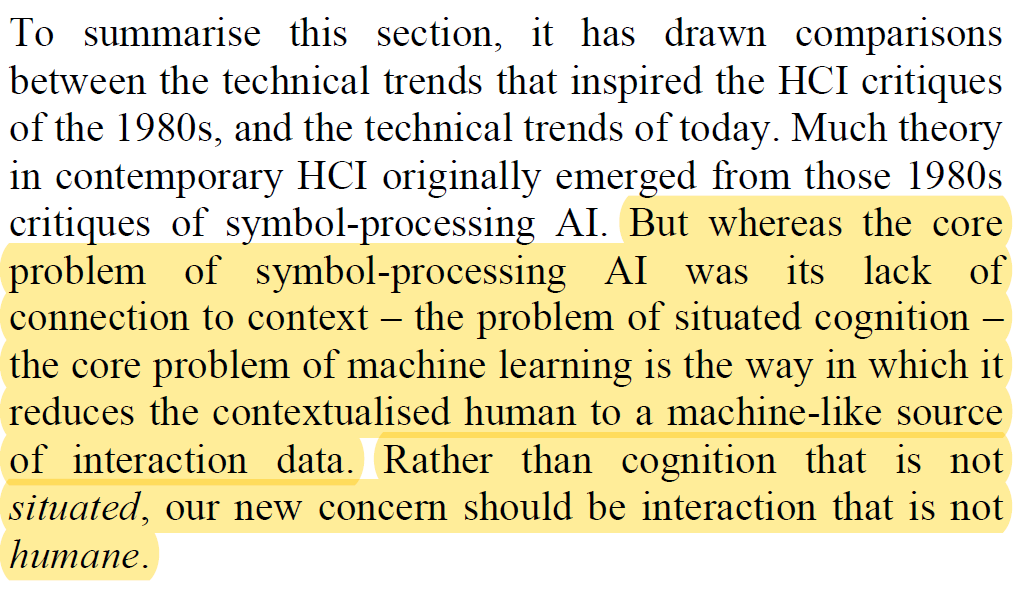
We need more nuanced ways to talk about medical & public health disagreements, without the simplistic black-and-white reductions that you either trust ALL doctors in ALL matters OR you must be anti-science. 1/
"Science is less the parade of decisive blockbuster discoveries that the press often portrays, and more a slow, erratic stumble toward ever less uncertainty." @zeynep 2/
https://twitter.com/math_rachel/status/1255508269906440194
Pundits urge people to “listen to the science,” as if “the science” is a tome of facts and not an amorphous, dynamic entity. @edyong209 3/
https://twitter.com/math_rachel/status/1445502842580525056
I cried w/ joy when I got my Pfizer vaccine. I am grateful to everyone who contributed to the vaccines. And I am grateful to the scientists who proved that #COVIDisAirborne & advocate for better ventilation
@jljcolorado @kprather88 @trishgreenhalgh thelancet.com/article/S0140-… 4/
@jljcolorado @kprather88 @trishgreenhalgh thelancet.com/article/S0140-… 4/
Modern medicine saved my life. I will forever be grateful that I got a prompt diagnosis & effective treatment when I had a life-threatening brain infection a few years ago 5/
https://twitter.com/math_rachel/status/1326966747266629632?s=20
Also: As a woman with chronic illness, doctors have doubted & misdiagnosed me, repeatedly. I was sent home from the ER in unbearable pain with only aspirin & no tests, when I actually needed *brain surgery*. 6/
A doctor told me the severe heart palpitations that kept me from sleeping for 4 days were “anxiety”, when actually I had a foreign object in my heart (PICC line 5cm too deep). 7/
I wasn’t believed the 1st time I dislocated my shoulder. After the 2nd time, my orthopedic surgeon said I could have avoided my shoulder surgery if I had gotten treatment the 1st time. 8/
Almost all patients with chronic illnesses or disabilities have experiences like this-- of being dismissed, disbelieved, misdiagnosed, given inaccurate info, & harmed by the healthcare system. 9/
bbc.com/future/article…
bbc.com/future/article…
None of this is surprising if you are familiar with the research on sexism, racism, ableism, anti-fat bias, and other biases & blindspots in medicine. Medicine is not absolute truth. 10/
https://twitter.com/math_rachel/status/1441569404697808899?s=20
Black people, including Black children, are given less pain medication. One study found medical students believe that Black people feel less pain than white people. And yet medicine is supposed to be infallible? 11/
washingtonpost.com/health/racial-…
washingtonpost.com/health/racial-…
I’ve written about the political and cultural and historical context of medicine. We can’t understand medicine apart from this. 12/
fast.ai/2021/10/12/med…
fast.ai/2021/10/12/med…
I know “do your own research” is a tagline for anti-vaxxers & conspiracy theorists (who have done so much harm)
BUT as a patient, all my personal experience has been that patients absolutely need to read research papers. 13/
BUT as a patient, all my personal experience has been that patients absolutely need to read research papers. 13/
Most doctors are unreasonable time constraints. They don’t have enough time to spend with each patient or to keep up with research outside their specialization. Many patients with complex or neglected conditions have more time & motivation to keep up on the latest research. 14/
I admire the long covid patient advocates of @patientled @itsbodypolitic @C19LH_Advocacy and other orgs. It saddens me to see a few doctors in their hubris dismiss their valuable expertise. 15/
https://twitter.com/patientled/status/1415766830661124102?s=20
ME/CFS patients have been compared to anti-vaxxers for pushing back on a now discredited study that actively harms them. We need more recognition that pushing back on faulty science is a crucial part of science. 16/
statnews.com/2016/09/21/chr…
statnews.com/2016/09/21/chr…
Vaccines are safe & effective. I admire the work of CDC & WHO to promote vaccine science AND I supported @jeremyphoward in contradicting the CDC & WHO (in March 2020 he argued that masks were useful for ordinary people) 17/
https://twitter.com/jeremyphoward/status/1242894378441506816?s=20
I contradicted several MDs I knew in early March 2020, who were telling people that they should worry more about the flu than covid. I co-wrote this viral post (this was before there was shelter-in-place anywhere in the USA) 18/
https://twitter.com/jeremyphoward/status/1237047880214392832?s=20
We got some criticism that we should shut up about public health issues & trust the experts. But we also got many responses like the one below, that we helped people take covid seriously 19/
https://twitter.com/jeremyphoward/status/1238558956647116801?s=20
I was concerned about long-term effects and skeptical of “young people have zero reason to worry” from the start (tweet from march 12, 2020) 20/
https://twitter.com/math_rachel/status/1237875535176323079?s=20
Jeremy got tremendous pushback against #masks4all in the early days (including from people that now act like they supported masks all along). Advocacy work is stressful & exhausting, and I admire him for doing it. 21/
washingtonpost.com/national/at-th…
washingtonpost.com/national/at-th…
People have selective memories, and forget how common some now (mostly) disproven stances were back then among doctors, that flu kills more than covid, that masks are harmful for ordinary people, no reason to worry about long-term effects, etc 22/ 





I still see a lot of arguments that are solely appeals to authority: “This one doctor is THE expert, so you’re automatically wrong and they’re right [that long covid is no big deal, that kids can’t wear masks, etc]” on topics that are highly debated. 23/
Some doctors are advocating for public safety, recognize the seriousness of long covid, and listen to patients. There are some great doctors & researchers out there, including @drajm @DrZoeHyde @dgurdasani1 @PutrinoLab @VirusesImmunity @drgregkelly @MBVanElzakker & more 24/
It is deeply disturbing to see a few doctors given platforms to intentionally mislead and for “contrarian” MDs to launch careers as pundits with false & harmful messages about covid. 25/
I see a few doctors being both incorrect (LongCovid is just “a little fatigue”, it’s probably psychogenic, etc) AND very patronizing (suggesting that those of us without MDs shouldn’t be allowed to speak up on these topics), a disastrous combo. 26/
Medical expertise is valuable AND doctors disagree on many issues AND many doctors are great AND some doctors get some things seriously wrong AND all these things are true at once. 27/
Patients have valuable and essential expertise.
I speak about this more in my @StanfordAIMI AI in Medicine keynote: bit.ly/MLmed. I was invited to speak as an AI researcher, but my expertise as a patient is just as valuable. 28/
I speak about this more in my @StanfordAIMI AI in Medicine keynote: bit.ly/MLmed. I was invited to speak as an AI researcher, but my expertise as a patient is just as valuable. 28/
• • •
Missing some Tweet in this thread? You can try to
force a refresh

















